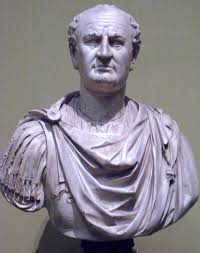|
Saturdee
Opry Links # 109: "Tito" Special!
Saturdee Opry Links is ready for you to embrace unenthusiastically! Today: overture and ten selections from Mozart's least-liked, least performed opera, "La Clemenza di Tito!" This is uncharacteristic Mozart---no frivolity allowed. Nothing but calm, stately, sober, gorgeous music. Plus a touch of fairy tale, in that the Emperor of Rome is portrayed as a benevolent guy! All researched and posted for you, to distract and calm from the horrors of our time. Plus! Two encores of "unbridled passion!"
  
Emperor Titus of Rome Wolfgang Amadeus Mozart Soprano Ying Fang
Saturdee Opry Links Overture
"La Clemenza di Tito," by Mozart.
https://www.youtube.com/watch?v=yAJVbylLDEU&feature=youtu.be
1.
Mozart's last opera, "La Clemenza di Tito"---"The Clemency of Titus"---is remarkable for a number of reasons, beginning with the fact that it involves a president, er, that is, emperor, who is (brace yourself): benevolent, prizing the well being of his people above all, and beloved. Remind you of Trump? Yes, me too---because Titus is everything Trump is not. Here is mezzo-soprano Kate Lindsay with the aria, "Torna di Tito a lato." Wait---why is a soprano singing the male role of Annius? See SOL post # 5.
Setting: The Imperial garden
Synopsis: Sextus and Annius meet after Sextus set fire to the city and tried to kill the Emporer. Sextus believes he must leave the country, but Annius tries to persuade him that it was a mistake and that Titus will forgive all if Sextus returns and confesses.
https://www.youtube.com/watch?v=DJsxBC5upSI
Translation:
https://www.opera-arias.com/mozart/la-clemenza-di-tito/torna-di-tito-a-lato/
2.
As I mentioned, there are many remarkable things about Mozart's last opera, "La Clemenza di Tito," which premiered in 1791. First, he wasn't keen on writing it, and took the job because it paid well (taking time out from the nearly finished "Magic Flute" to write it.) Second, the opera had already been written---using the same libretto (which Mozart tweaked)---by FORTY other composers. Correct, 40. It had been a long-standing hit, or standard. Mozart was asked to write it for political reasons (that he was probably oblivious of) having to do with the coronation of Leopold II, Holy Roman Emperor, as King of Bohemia. Third, well, you'll have to wait for post number three for the third reason. Now here is the basic plot: Tito (Titus) is Emperor of Rome. vitellia loves him, but he loves another, so Vitellia goes nuts. She fiendishly manipulates the aptly named Sextus---who is in love with her---to murder Tito. Sextus blows it, and is imprisoned, and Vitellia realizes that she must confess all to Tito---because Sextus is ready to die for her if she does not. Broken and broken-hearted, she abandons her hopes for throne and marriage to Tito. Got it?
Here is Elza van den Heever with "Non Piu di Fiori," or "No More Flowers."
https://www.youtube.com/watch?v=3lN1-0OVAqw
Translation:
https://www.opera-arias.com/mozart/la-clemenza-di-tito/non-piu-di-fiori/
AND, just because she was so wonderful, here is a recording of same with Lucia Popp:
https://www.youtube.com/watch?v=__ENMyexMaM
3.
As I was saying, there are many remarkable things about Mozart's "La Clemenza di Tito." Picking up from our previous post, item number three is that the opera is 100 percent lacking in: wit, hysteria, glibness, plots that George S. Kaufman (who wrote the best Marx Brothers films) would have envied, relentless, manic melody-making, and general amoral giddiness. It is as if Mozart took his ADHD medication. Why? Well, this is opera seria (serious opera!), for one thing, so all those traits for which Mozart is duly famous were not called for here. There is also much "stand and sing" fare, showcasing the opera's many stately, lovely arias and multi-part singing. As a result of all this, "Tito" was long dismissed by prominent critics as second-rate Mozart. Only in very recent years has the work been revived, and appreciated on its own merits---which are substantial. The character of the music is consistent with other late Mozart works, notably the final symphonies, for its sobriety, depth, reflection. It has that "burnished wood" quality that you find, for example, in symphonies 40 and 41 (let alone the Requiem.) And there is more, which we'll pick up in the next post.
Here is soprano Ying Fang with "S’altro che lagrime," from act 2.
Synopsis:
Servilia finds Vitellia crying. Servilia believes that she is weeping because Sextus will die and tells her in this aria that her pity for Sextus is useless for he will still die. Unbeknownst to Servilia though, Vitellia is crying because she is the one who caused his Sextus's impending execution.
https://www.youtube.com/watch?v=u-O9lX2spxg
Translation:
Saturdee Opry Links EXTRA!
IT TOOK 288 YEARS, BUT L.A. OPERA'S "CLEMENZA DI TITO" WAS WORTH THE WAIT
https://www.latimes.com/entertainment/arts/la-et-cm-clemency-titus-review-20190303-story.html
4.
Yes, there are still more amazing things about Mozart's least-loved and least successful opera, "La Clemenza di Tito." Here are a couple: it was written in about eighteen days (!), and Mozart's rival "great composer" of the era, Antonio Salieri (who did NOT murder Mozart), declined. You'll notice that the selections so far have not reflected the chronology of the opera and story. That's because at SOL, we tend to feature interesting highlights, and not (usually) to re-create the outline of a plot. And in this case, the plot is not heavy on suspense, not an operatic page-turner (though it does have a surprise ending---more later.) What this opera does have is a subtly infectious allure that stems from the seriousness and beauty of the writing. The more patient you are with it, the more you are rewarded. Here, from act one, is the germ of the plot that leads to Vitellia plotting to kill Tito (Titus.) Here is tenor Gregory Kunde with the noble "Del Piu Sublime."
https://www.youtube.com/watch?v=9gsZ4_t60hU
Setting: The Forum in Rome
Synopsis: Titus has just announced that he will marry Servilia, Sextus's sister, because Rome will like her. He sings that the real joy of being a ruler is being able to reward faithful subjects like Servilia with favors, such as this marriage (which she doesn't want since she is in love with Annius).
Notice Titus's noble impulses in the last lines of the aria translation:
https://www.opera-arias.com/.../del-piu-sublime-soglio/
ANNNND, here is a better Mozart tenor with the same aria, from a studio recording:
https://www.youtube.com/watch?v=HpVXNC30Qq0
5.
While it is not remarkable that two male roles in Mozart's "La Clemenza di Tito" are so-called "trouser roles," it might seem that way to our eyes and ears today. In baroque opera, and Mozart's time, tradition had it that castrati (males castrated before puberty in order to preserve vocal beauty, if not sanity and happiness) sang many a male role. (The why of this would require scholarly explanation of music and history, for which SOL is woefully unqualified.) In fact, securing a "leading castrato" for one of the roles in this opera was part of the original deal to get it done. The castration tradition, happily, no longer exists, and women routinely perform these caponized roles today. Why? Mozart wrote the parts for soprano voices, and all the harmonic implications that would bring. (Sorry, LGBTQ, no sexual implications here.) Here is a duet, “Ah perdona al primo affetto,” from act one---with soprano Ying Fang as Servilia and soprano Emily d'Angelo in the trouser role of Annio. With English subtitles.
https://www.youtube.com/watch?v=Qv5brHpC3s8
Synopsis:
Tito decides to choose Sesto's sister Servilia to be his empress, and orders Annio (Sesto's friend) to bear the message to Servilia (aria Del più sublime soglio). Since Annio and Servilia, unbeknownst to Tito, are in love, this news is very unwelcome to both (duet "Ah, perdona al primo affetto").
6.
There is often the same sense of mild sadness, resignation to fate, in the arias of Mozart's opera seria, "La Clemenza di Tito." And I don't mean the words, but the quality of the music. The whole opera is imbued with a similar tone, which helps to (obvious to say) create a sonic continuity, and ensure the emotional impact of the surprise ending (more later.) Here is the touching, tender trio, "Se al volto mai ti senti," ("If ever you feel a light breeze. . ."), with mezzo-soprano Elina Garanca, soprano Barbara Frittoli, and bass-baritone Oren Gradus. With English subtitles.
https://www.youtube.com/watch?v=GXP9Uflh3Hw
Synopsis:
Publio, captain of Praetorian guards, comes to arrest Sesto for the attempt at killing the emperor. Sesto obeys and tells Vitellia that even now he still loves her. Vitellia feels guilty and weeps in despair and repentance, Publio is touched by her tears, but nothing can sway his loyalty to the law.
Saturdee Opry Links EXTRA!
EXCERPT:
Critic Alfred Einstein in 1945 wrote that it was "customary to speak disparagingly of La clemenza di Tito and to dismiss it as the product of haste and fatigue," and he continues the disparagement to some extent by condemning the characters as puppets – e.g., "Tito is nothing but a mere puppet representing magnaminity" – and claiming that the opera seria was already a moribund form.
https://en.wikipedia.org/wiki/La_clemenza_di_Tito
7.
Astounding, it seems, that Mozart could shift gears from "The Magic Flute," his epic of fantasy, frivolity, and ribald farce, to the hard-boiled morality play that is "La Clemenza di Tito," then go back to finishing the tale of the Queen of the Night & Co. Such are the adroit talents of mega-genius. Here is an aria exuding nothing but the most elegant seriousness, "Tardi s'avvede," sung movingly here by baritone Kurt Rydl. What a set! "It is no wonder /if a true heart / full of honour/ believes all other hearts incapable /of disloyalty."
https://www.youtube.com/watch?v=x8zP-_CrPAE
Setting: the Imperial garden
Synopsis: Titus cannot believe that Sextus could attempt his murder and set fire to the city. He asks Publius about Sextus's loyalty and Publius responds with this aria, singing that a truly loyal person would not commit such a crime.
Translation:
https://www.opera-arias.com/mozart/la-clemenza-di-tito/tardi-s%27avvede/
8.
Now here is one of those frantically melismatic arias that is a typical Mozart-era device for conveying excitement. You think melisma is big in today's awful pop music? Ain't nothin' new under the sun. (Melisma means simply assigning many notes to one word or even syllable, now done to spectactularly, vulgarly gratuitous effect in pop crapola.) Here is the most difficult, probably, aria in "La Clemenza di Tito," in which Vitellia has heard the news about Tito's interest in Servili, and is again boiling with jealousy. She urges Sexto to assassinate Tito. He agrees, singing "Parto, parto, ma tu, ben mio" ("I go, but my dearest. . .") Note: this aria is famous for being accompanied by something called a basset horn, which is a kind of not-quite-bass clarinet. Listen for it. Here is Joyce Di Donato in the trouser role. With English subtitles!
https://www.youtube.com/watch?v=avL0XD7-G8Q
Setting: The Imperial garden
Synopsis: After Servilia orders Sextus to kill Titus and set fire to Rome, Sextus meekly acquiesces and sings that he will do anything for her beauty and love.

9.
Was the actual Titus a nice guy? Yes and no, with the "no" part being, oh, rather large, having loused up the world for about 2000 years. You see, put in charge of suppressing the "Jewish rebellion" in Jerusalem, Titus wiped out, by some accounts, a million Jews, enslaved a hundred thousand or so, and left the remainder to flee anywhere, creating the Jewish diaspora. Not a humanitarian legacy! As emperor, Titus, who ruled from AD 79 to AD 91, completed the Flavian Amphitheatre, better known as the Colosseum. He was held in high regard for this by his people, and especially for extreme generosity in coming to the aid of hi s subjects following the eruption of Mt. Vesuvius in AD 79 and a gigantic fire in Rome in 80.
For the purposes of SOL and Mozart, the Emperor is a simplified fictional character with a basis in fact, hence his nobility. At the end of "La Clemenza di Tito," the principals who have plotted his attempted murder essentially throw themselves at his feet, awaiting execution. Boy, are they in for a surprise. He is intent only on seeing the good in people. Here is the first part of his final declamation, "Ah se fosse," sung by Mathew Polenzani. With English subtitles.
Setting: The Imperial Garden
Synopsis: After Servilia---who has plotted to kill Titus---throws herself at Titus's feet, begging him to let her marry Annius, Titus relents and declares that if everyone in his court was so honest, being a ruler would be a lot easier.
https://www.youtube.com/watch?v=IcVUUCwxFFY
About the real Titus:
https://www.ancient.eu/titus/
Translation:
https://www.opera-arias.com/mozart/la-clemenza-di-tito/ah-se-fosse-intorno-al-trono/
FINAL BOW:
At the end of Mozart's stately, soulful opera seria, "La Clemenza di Tito" ("The Clemency of Titus"), the meaning of the title is revealed. Confronted with those who have plotted to kill him out of love triangles and jealousy, the Emperor essentially says love will out. If only the real Titus had been such a person, or countless other emperors, kings, presidents, premiers! Here is the translation of his final aria:
"If a hard heart is necessary to a ruler,
ye benevolent gods,
either take the empire from me
or give me another heart.
If I cannot assure the loyalty
of my realms by love,
I care not for a loyalty
that is born of fear."
Yes, sounds just like something Trump would say, doesn't it? Urp. Here is the aria, "Se all'impero," sung in all its melismatic glory by Gregory Kunde, followed by the conclusion, with septet and chorus, of the opera.
"Se all'impero" (aria begins at 2:30)
https://www.youtube.com/watch?v=EvULZp9ZolA
Finale, with sextet and chorus:
https://www.youtube.com/watch?v=O3ei4WcP_uc
SYNPOSIS:
Tito decides to send for Sexto first, attempting to obtain further details about the plot. Sexto takes all the guilt on himself and says he deserves death, so Tito tells him he shall have it and sends him away. But after an extended internal struggle, Tito tears up the execution warrant for Sexto! If the world wishes to accuse him (Tito) of anything, he concludes, it should charge him with showing too much mercy, rather than with having a vengeful heart. In the amphitheatre, the condemned (including Sexto) are waiting to be thrown to the wild beasts. Tito is about to show mercy, when Vitellia offers her confession as the instigator of Sexto's plot. Although shocked, the emperor includes her in the general clemency he offers. The opera concludes with all the subjects praising the extreme generosity of Tito; he then asks that the gods cut short his days, should he ever cease to care for the good of Rome. Wow.
SATURDEE OPRY LINKS ENCORE!
Seeing as today's edition was devoted entirely to the calming, beautiful, heartening final opera of Mozart, "La Clemenza di Tito," some emotional declaiming is in order, don't you think? Here is Leoncavallo's eternally uplifting "Mattinata," here sung endearingly by Sumi Jo.
https://www.youtube.com/watch?v=g6WD7Lr2LhE
Translation:
https://www.lieder.net/lieder/get_text.html?TextId=10075
Saturdee Opry Links Encore # 2!
More shameless emoting! Here is the classic Neapolitan song, "Torna a Surriento," with Luciano. "Look at the sea, how beautiful it is!"
https://www.youtube.com/watch?v=wbdM7yuNGYI
Translation:
https://en.wikipedia.org/wiki/Torna_a_Surriento
Back to Opera Links
Back to Home Page
|



